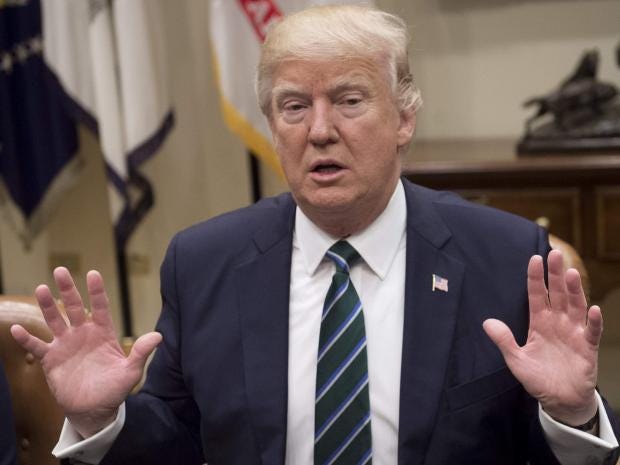
The Trump administration is currently short the votes needed to repeal and replace on Obamacare in a vote that could define Donald Trump's presidency, according to a dissident Republican faction leader.
More than 25 members of the deeply conservative Republican Freedom Caucus in US House of Representatives are set to vote ‘no’ on the American Health Care Act. Mr Trump had promised several times during his campaign and in the first few months of his presidency to repeal the healthcare plan and replace it with one that was not a "disaster."
The vote is set to take place on 23 March. With expected absences, the Trump administration will need 215 votes to pass and could only really afford 22 Republicans to defect from the party line.
White House Press Secretary Sean Spicer said during a press briefing that Vice President Mike Pence and the Office of Management and Budget Director Mick Mulvaney have “flooding the Hill” trying to lobby conservative members for their vote.
“If you want to see Obamacare repealed and replaced, this is the vote. This is the time to act. If you’re waiting for your chance,” the 23 March vote is the only option, Mr Spicer said emphatically.
Freedom Caucus chair Representative Mark Meadows of North Carolina told reporters after a meeting at the White House that the group thinks those Republicans wanting the bill to pass through the House “need to start over and do a bill that actually reduces premiums.“
The Freedom Caucus’ main objection, and that of some other Republicans, is that the Republican replacement proposal does not repeal the “essential health benefits” outlined in Obamacare.
The clause states which services insurance plans must cover: trips to the emergency room, maternity and newborn care, mental health services, prescription drugs, and wellness visits - which includes cancer screenings for adults and vaccinations for children.
Obamacare also guarantees some coverage for all Americans who apply, meaning those with pre-existing conditions cannot be denied coverage.
The replacement plan keeps that feature as well but does not put caps on premiums for those individuals or older Americans in the 50 to 64 year old range who are not yet qualified for the Medicare program.
Mr Meadows and his group think that these mandated items drive up the monthly premiums individuals are now paying under Obamacare and say that keeping that part of Obamacare is what is going to keep rates high under the proposed new plan.
The Republican replacement, which does cut the federal budget deficit according to the Congressional Budget Office, also employs an age and income matrix for determining a tax credit, or subsidy, on premiums.
This means that older Americans making little money would likely be the most negatively affected by the plan and the younger, healthier, and/or wealthier will not.
The vote could actually be rescheduled per Congressional rules, however Republican leadership has insisted the vote will remain on the schedule for 23 March.
Part of the issue for the Trump administration is the way the bill was brought up - a sequence called the “reconciliation process,” which Mr Spicer spoke about during his press briefing.
This process assures that Democrats cannot filibuster the bill by Democrats in the Senate, where the bill would go for vote once it passes the House.
Alabama Representative and Freedom Caucus member Mo Brooks said no new substantive changes were put forth by the White House during their meeting.
No members of this caucus have come forward to say their “no” votes have changed since the meeting.
Mr Spicer however was clear in his briefing, saying “there is no Plan B. There is Plan A and Plan A” and called Mr Trump “the closer.”
Mr Spicer added, “when the votes come up, we’ll have the votes.”







